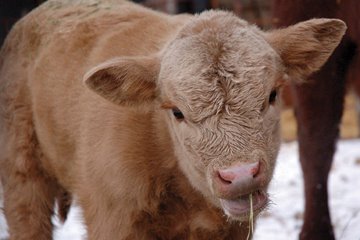by Matthew Wright
The federal government took a step in the right direction as far as cattle producers are concerned with the creation of a new trade secretariat to expand foreign markets to Canadian beef products. The industry was severely crippled after the BSE outbreak in 2003 and has yet to fully recover the many lucrative markets it lost at that time.
“This is a concrete step to improve foreign market access for Canadian cattle producers. We have been pushing for this for quite some time and are extremely pleased to see that the minister recognizes the importance of the cattle industry in this country, it shows real leadership,” said MCPA president Joe Bouchard.
Bouchard said the need for a new trade secretariat armed with the appropriate credentials to secure foreign markets is essential to keeping the Canadian cattle industry competitive in the global market. Furthermore, he believes this investment by the government could yield tremendous returns.
A week after this announcement, Minister Gerry Ritz successfully secured an agreement, in-principle, with Hong Kong on a phase-in timetable to fully re-establish Canadian beef exports in that country. Industry estimates put Canadian exports to that market at almost $26 million, or double the current figure.
“This shows how having the right people at the table gets things done. Fresh, innovative strategies such as this are exactly the kind of actions we need to enhance our industry. We need the secretariat to get down to business right away to increase our opportunities for marketing our high quality product worldwide,” Bouchard said.
Gib Drury, board chair of the Canadian Beef Export Federation agreed.
“Minister Ritz is showing the diplomatic effort needed to produce the results our industry needs,” he said.
Experts are predicting an increase in demand for high protein diets including beef around the world especially in the quickly developing markets of India and China. With improved market access there are significant opportunities to enhance Canadian cut-out values. It is estimated that increased market access for Canadian producers would result in an extra $90 per head of cattle.
Drury said that the deal inked with Hong Kong will go along way to expanding Canada’s export markets. He expects it to open the door to the huge Chinese market as well as others in the expanding Asian markets.
“The Hong Kong deal is a precursor to getting us into China and Japan and puts us that much closer to finalizing a deal with Korea,” he said.
In recognition of the importance of market access, Canada’s agricultural sectors continue to enhance our animal health and food safety systems. In the beef and cattle sector, the development of a global branding strategy based on the Canadian Beef Advantage (CBA) illustrates this commitment. At present this program serves to communicate related achievements including Canada’s leadership in establishing the first mandatory national cattle identification system in North America. In the future, enhancements to traceability capabilities and expansion of on-farm food safety initiatives such as the Verified Beef Production (VBP) program will be central to maintaining and expanding market access.
The cattle sector in Canada has long been in need of a dedicated trade directorate to move its industry forward on the world stage and with this new beginning, the signs are all pointing in the right direction.
In fact, Drury said that in the next few weeks he plans on accompanying Minister Ritz to negotiate trade deals in the Middle East with Saudi Arabia, United Arab Emirates and Lebanon.
Welcome to the Online Edition of Cattle Country!
Updated with every new issue
Past issues will be available in the archive. If you are interested in reading Late Breaking News between paper deadlines, scroll down to the bottom of the page. The most recent information will be posted first.
Past issues will be available in the archive. If you are interested in reading Late Breaking News between paper deadlines, scroll down to the bottom of the page. The most recent information will be posted first.

Friday, March 13, 2009
Subscribe to:
Post Comments (Atom)

No comments:
Post a Comment